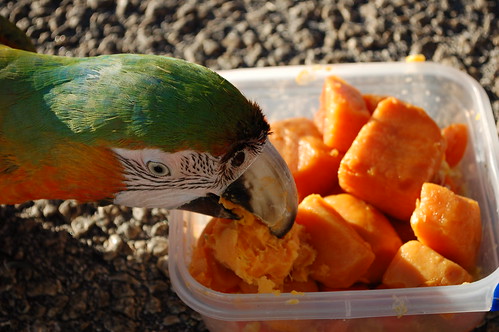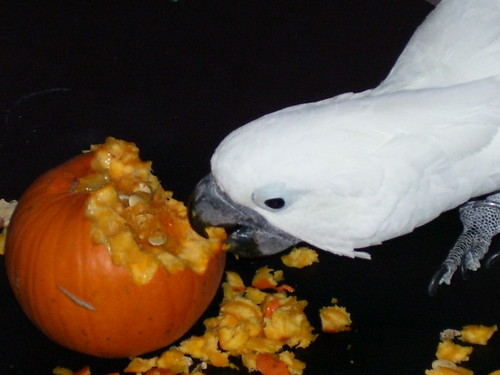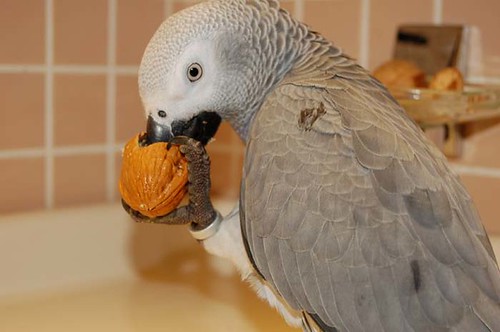
Camelot macaw
Maybe it’s my suspicious nature, but whenever a doctor or vet “highly recommends” a name brand product (especially if they sell it), I think twice. To be fair, I must acknowledge that many may carry products because they truly beileve in their health benefits. But there are also those who carry products, and push them, because it benefits their bank accounts.

Umbrella cockatoo
It seems like anytime someone takes their bird to the vet, even when a well-bird exam turns up perfect health, they report that their doctor has recommended a lifelong regimen of red palm oil. When the more probing clients ask why their bird needs this supplement, the answer usually relates to improved feather condition.
However, vets often neglect to mention the product’s downside: LDL cholesterol raising, artery clogging, heart disease instigating saturated fats by the truckload. (Heart disease in parrots has shown a sharp increase over recent years.) Worse, by pushing this “quick fix” product, they are blowing the opportunity to teach their client about proper diet.
Red palm oil IS loaded with beta carotenes, which convert to vitamin A in the body. But so are carrots, winter squashes, peppers, dark leafy greens, apricots, mangoes… If your bird is deficient in vitamin A, doesn’t it make more sense to improve the diet than to use a supplement, especially one with such an unhealthy downside?

Congo african grey
Vets will often recommend red palm oil to clients (a common brand is AVIx Sunshine Factor) with plucking birds claiming that it will help to stop or reduce this behavior. It is true that vitamin A improves feather and skin condition, and red palm oil has plenty of that. Dry itchy skin is sometimes the cause of plucking.
However, most of the “evidence” that red palm oil is responsible for eliminating plucking is purely anecdotal. For instance, the person who brings home the plucked macaw from a rescue and starts him on red palm oil – when the plucking stops, the credit is given the red palm oil, not the improved diet and the more suitable environment. There is no conclusive evidence that red palm oil fixes plucking.
Plucking issues are more successfully treated with medical investigation, change to the environment and improved diet and social interaction (which includes training).

Blue Throated Macaw
Your vet should only have YOUR bird’s best interests at heart and products should be recommended only as they are needed. I think you would agree that the money you budget for your parrot’s needs each month is better spent on a foraging toy than on an unnecessary, and potentially dangerous, dietary supplement.
If your bird is already in fine feather and on a good diet, please ask your vet this: “why does MY bird need red palm oil?” If it is suggested for valid medical or dietary reasons, ask your vet how to make adjustments to your bird’s diet to account for the increased fat.
NOTE: As red palm oil increases in popularity, it is having a devastating environmental impact on our planet and wildlife. Please read this.
Author Patty Jourgensen specializes in avian health, behavior and nutrition and has been working with and caring for rescue birds since 1987.


13 comments
Leave a comment